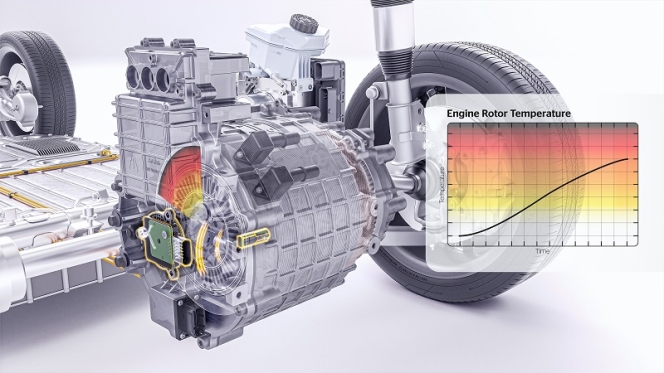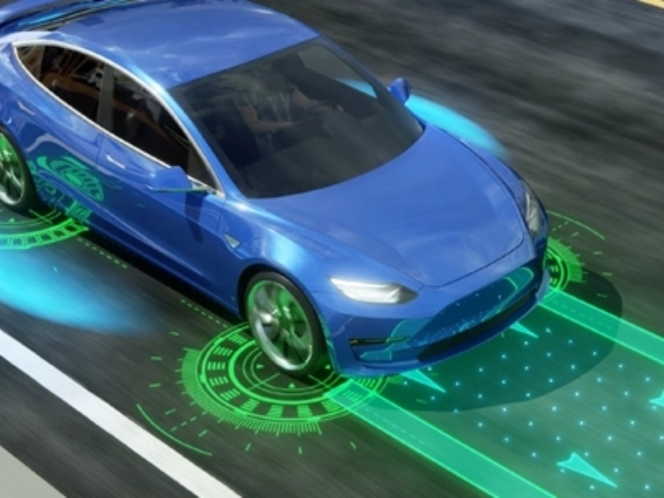Continental’s New Sensor Tech Measures Heat In EV Motors, Claims To Reduce Rare Earths To Protect Magnet
- By MT Bureau
- June 04, 2025

German automotive technology giant Continental has developed a new sensor technology that is said to significantly enhance the efficiency and sustainability of electric vehicle (EV) motors.
For the first time, their new e-Motor Rotor Temperature Sensor (eRTS) directly measures the temperature inside permanently excited synchronous motors on the rotor itself.
This innovative approach delivers substantially more precise measurement results than current software-based temperature simulations, drastically reducing the tolerance range from 15deg Celsius to a mere 3deg Celsius. The enhanced accuracy offers a dual benefit for vehicle manufacturers: it enables them to reduce the reliance on costly rare earth elements used to boost magnet heat resistance and simultaneously improve potential motor performance. This, in turn, paves the way for greater sustainability in EV production.
The eRTS is a key development from Continental's E-Mobility Sensors (EMS) product centre, which is dedicated to creating advanced sensor technologies for electric vehicles.
Bin Huo, Head of Passive Safety and Sensorics (PSS) segment, Continental, said, "With less resource consumption and lower costs, eRTS sensor technology is advantageous over current solutions. This innovation shows that investing resources and focusing expertise in our product centre was absolutely the right decision. We will continue to successively expand our EV sensor portfolio."
Higher Measuring Accuracy
The eRTS system comprises two distinct components: a wireless mote temperature sensor unit positioned close to the magnet within the EV motor and a wired transducer element situated outside the motor, connected to the inverter control.
Rotors operate under extreme conditions, with temperatures potentially reaching up to 150deg Celsius. Consequently, precise monitoring and control of heat development in EV motors are paramount. Presently, heat development is not measured directly but is instead calculated based on data from the stator temperature sensor, phase current measurements and environmental variables. This indirect method results in a tolerance range of up to 15deg Celsius. To safeguard magnets from demagnetisation due to excessive heat, expensive rare earth elements are typically used to cover this entire tolerance range and ensure sufficient heat resistance.
The significantly greater measuring accuracy of the eRTS, which reduces the tolerance range to just 3deg Celsius, presents car manufacturers with new design possibilities and freedom in permanent magnet synchronous EV motors.
A considerable proportion of costly rare earth materials, which would otherwise be required to account for the wider tolerance range for safety reasons, can now be saved. Furthermore, the improved accuracy offers the intriguing prospect of enhancing motor performance by pushing the operational limits closer to the actual temperature threshold.
Christoph Busch, Lead – Product Centre, Continental, said, "Our E-Mobility Sensors product centre aims to increase efficiency and sustainability in electric vehicles. The eRTS technology is a prime example of this: reducing the use of rare earths contributes to a more sustainable supply chain, especially given that the number of EVs is expected to greatly increase in the coming years and decades. In combination with other sensor technologies, such as the e-Motor Rotor Position Sensor, it can even act as a system solution to create synergies that can save car manufacturers money and effort."
Ultrasound Technology
The eRTS's two components, the mote element and the transducer element, work in tandem. The mote temperature sensor unit measures the temperature directly at the target area, as close as possible to the magnet. Crucially, the wireless mote draws its energy solely from the wired transducer, which is connected to the Electronic Control Unit (ECU) and simultaneously provides the transducer with its measuring data. The transducer is located outside the EV motor on the chassis and transmits temperature information to the inverter control via a communication interface. Both the mote and transducer communicate using Piezo ultrasound, which also facilitates the energy supply to the mote.
LTTS Secures Multi-Year Deal From Automotive OEM For Engineering And R&D
- By MT Bureau
- January 28, 2026

Bengaluru-headquartered ER&D company L&T Technology Services (LTTS) has announced a multi-year engagement within its mobility segment from an automotive manufacturer. The agreement involves software, connectivity and digital engineering services across vehicle technology domains. This win follows the company’s investments in R&D labs and mobility infrastructure designed for programs with global manufacturers.
The engagement covers mobility engineering capabilities, including embedded systems, digital platforms, verification and validation, cloud integration and cybersecurity. LTTS intends to use its engineering expertise and delivery frameworks to support the customer's technology roadmap.
At present, LTTS operates 22 design centres and 100 innovation labs globally.
The agreement strengthens the partnership between LTTS and the automotive manufacturer in the area of mobility engineering. The company provides design, development, and testing services across the mobility, sustainability, and tech segments.
Alind Saxena, Executive Director and President, Mobility and Tech at L&T Technology Services, said, “We are proud to deepen our partnership with the valued customer through this strategic engagement. LTTS brings together domain-led engineering, secure development practices and excellence in global delivery to accelerate the future of premium mobility. The win reflects the trust placed in our teams and our commitment to delivering world-class engineering at scale”.
Valeo And NATIX Network Partner To Develop Open-Source World Foundation Model
- By MT Bureau
- January 25, 2026

French technology company Valeo and NATIX Network have announced a partnership to develop a multi-camera World Foundation Model (WFM). The project combines Valeo’s research in artificial intelligence and generative modelling with NATIX’s decentralised physical infrastructure network (DePIN) to create an open-source platform for autonomous driving and robotics.
The initiative aims to move beyond perception-based models by creating a system capable of predicting future states and reasoning about physical interactions in a four-dimensional environment. The model will be trained using NATIX’s data network, which has collected 600,000 hours of video data across the US, Europe and Asia over seven months. This data provides the multi-camera inputs necessary for the spatial perception required by autonomous vehicles and robots.
The partnership builds upon Valeo’s existing open-source frameworks, VaViM (Video Autoregressive Model) and VaVAM (Video-Action Model). While these frameworks were previously trained primarily on front-camera datasets, the integration of NATIX’s multi-camera network expands the AI’s field of vision to 360 degrees.
Under the open-source framework, the partners will release models, datasets and training tools. This approach is intended to allow the research community to fine-tune models and benchmark physical AI across various driving conditions and geographic regions. The collaboration seeks to accelerate the deployment of end-to-end AI models by learning from real-world edge cases captured by vehicles in operation.
Marc Vrecko, Chief Executive Officer, Valeo’s Brain Division, said, “Since our creation in 2018, Valeo’s AI research center has been at the forefront of AI research in the automotive industry, especially in the fields of assisted and autonomous driving. Our goal has always been to advance mobility intelligence safely and responsibly. By combining Valeo’s generative world modeling research expertise with NATIX’s global multi-camera data, we are accelerating both the quality and the accessibility of next-generation end-to-end AI models, enabling the research community to build upon strong open models.”
Alireza Ghods, CEO and Co-Founder, NATIX, added, “WFMs are a once-in-a-generation opportunity — similar to the rise of LLMs in 2017–2020. The teams that build the first scalable world models will define the foundation of the next AI wave: Physical AIs. With our distributed multi-camera network, NATIX has a clear advantage of being able to move faster than large OEMs.”
- Tata Technologies
- Amazon Web Services
- InnoVent 2026
- Jaguar Land Rover
- Air India
- ES-Tec Group
- Warren Harris
Tata Technologies Concludes InnoVent 2026 Engineering Hackathon
- By MT Bureau
- January 23, 2026

Tata Technologies has announced the completion of the 3rd edition of its innovation hackathon, InnoVent 2026, supported by Amazon Web Services (AWS). The initiative invited engineering students to develop solutions for mobility challenges in the automotive and manufacturing sectors. The programme received participation from 10,247 students across 404 colleges in India, resulting in 2,822 projects.
The competition focused on the theme of intelligence-driven mobility for the year 2030. Participants received over 650 hours of mentoring and training from subject matter experts to convert their concepts into prototypes. The top 10 teams presented their work at the company's Hinjewadi campus in Pune before a jury of industry leaders from Jaguar Land Rover, Air India and ES-Tec Group.
Team Drushti from CMR College of Engineering & Technology, Hyderabad, secured the first prize of INR 300,000 for a system that customises vehicle infotainment for visually impaired drivers. Second place went to Team The T-Factor from Vellore Institute of Technology, Chennai, for an AI-based breakdown prevention system. Team SwarmSync from the International Institute of Information Technology (I²IT), Pune, took third place for an intelligent fleet management solution using V2X communication.
Tata Technologies offered career opportunities to all 42 finalists involved in the top projects. Furthermore, all participants were granted one-year access to the iGETIT learning platform to study emerging technologies. The finalist projects covered areas such as blockchain for vehicle security, wireless charging for electric vehicles, and AI-led battery monitoring.
The event featured a humanoid robot that performed roles such as coordinating panel discussions and interacting with attendees. A panel of industry experts discussed the global demand for engineering talent and the impact of technology on future mobility.
Warren Harris, MD & CEO, Tata Technologies, said, "InnoVent at Tata Technologies represents our conviction that the future is shaped by those who combine engineering excellence with human purpose to engineer a better world".
Kia India Reintroduces Driver Behaviour Monitoring Tech
- By MT Bureau
- January 23, 2026

Kia India has announced the re-launch of its Kia Inspiring Drive (K.I.D) Program, debuting alongside the New Kia Seltos. The initiative is a driving score system designed to monitor real-time behaviour and provide insights into habits. Accessed via the Kia Connect app, the programme will be rolled out across the company’s connected vehicle portfolio in phases.
The K.I.D score is calculated using a three-month rolling average based on parameters including rapid acceleration, rapid deceleration and sudden starts. To ensure data accuracy, the system applies a weighted value based on the specific vehicle. This methodology aims to reflect long-term driving patterns rather than isolated incidents.
The programme incorporates community-based leaderboards, allowing owners to compare scores and track their standing within the Kia community. By turning road safety into an interactive experience, the manufacturer intends to encourage responsible driving through recognition and competition.
The behaviour-based scoring system provides data to help users understand the impact of their habits on road safety. Kia is supporting the re-launch with a digital and press campaign to increase awareness among its customer base.
Atul Sood, Senior Vice-President – Marketing & Sales, Kia India, said, “Safety remains at the core of Kia’s philosophy, and with the re-launch of the Kia Inspiring Drive program alongside the New Seltos, we are taking another meaningful step towards encouraging responsible driving behaviour. By offering customers clear, data-driven insights into their driving patterns, the KID program empowers them to make safer choices on the road, while also enhancing their overall ownership experience.”







Comments (0)
ADD COMMENT